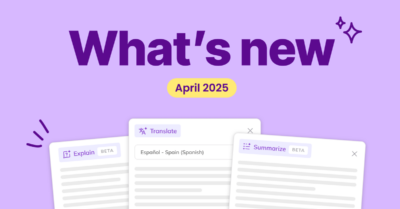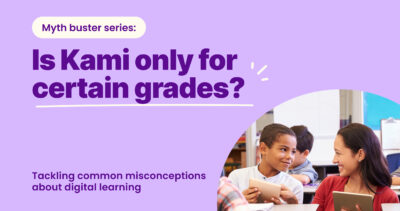Shirin Bradfield
Take your classroom to the next level by ensuring it’s set up to encourage all students to feel empowered, every day.
When reflecting on the idea of school or the classroom, they’re often thought of as places where students “have” to learn. So it’s no surprise that we strive to encourage positive engagement; changing the perspective of the classroom to be a place where students “want” to learn.
All going well, we create environments that help students truly love learning. So, now with a classroom full of highly engaged learners, why stop there; we gain and retain engagement, but how often do we allow students to “own” their learning?
Getting students from “wanting to learn” to “wanting to own their learning”, is the shift from student engagement to student empowerment.
So, how exactly do we empower students?
Freedom beyond choice
To encourage student voice and choice, and therefore student agency, we often look to giving learners multiple options – like assigning work and offering multiple ways to complete it. This is a simple strategy that can really boost motivation and engagement, but ultimately, students are still confined to a structure – they have lots of choices but very little freedom.
Instead, to make the shift from engaged to empowered, set students up with everything they need to complete the work in a way they can own. Make sure to fill the gaps that a lack of prior knowledge might leave behind with plenty of examples, resources, and insights – giving students the bigger picture allows them to carve their own path when getting from A-B.
For example, when setting out a language art assignment, you could supply a list of writing prompts for your students. However, the key here is not to make them compulsory. Instead of instructing them to pick from the list (no matter how vast), say they can simply use it as inspiration to guide their own creations!
Student-led learning
Shifting from the “having to” to “wanting to” learn mentality means trusting the competency and critical thinking of your students to allow them to direct their own learning. This can be a bit chicken and egg, as sometimes students don’t know what exactly they want to learn about a subject before they’ve really been introduced to it. Plus, you still have a lesson plan to stick to – but that doesn’t mean you have to throw student involvement out the window.
Finding ways to incorporate students’ interests, while still hitting your core learning objectives, is a huge win for student empowerment. For example, your young students might love social media. It may seem like a step backward, but by engaging in a topic they’re passionate about, explorations of culture, gender, wellness, and social norms can quickly rise to the surface. As long as you make your lesson objectives and goals clear, there’s little reason why students shouldn’t be capable of taking the lead on their own learning.
Healthy debate and discussions
We often set out super clear lesson plans or maps with the best intentions – maximizing student achievement. So when a lot of discussion goes on between many groups of students, we worry we won’t be able to cover all the material necessary to see the results we so desperately want. The truth is, healthy discussion and debate not only empowers students to explore and share different opinions, but it also enhances learning and memory! Opening the class up for discussion also reminds students that their perspectives matter – all while giving other students a chance to catch up or ask the questions necessary to stay engaged and therefore on the way to empowerment! Use discussion to your advantage and incorporate it in your lesson plan in order to shake off the time crunch and stay on track while enhancing empowerment.
Teach with tech
“Leave your devices off during class” – we know this instruction all too well. It’s often to simply minimize distraction and keep students on task, however, tech in the classroom can be super empowering! Tech opens a whole new door for learning; students can use their initiative to explore relevant podcasts, virtual field trips, video live streams and so much more. This style of learning also helps solidify the idea that learning can happen anywhere at any time – even when it doesn’t feel like learning at all. Tech in the classroom quite literally puts the power in the hands of your students; this can sometimes feel overwhelming, as it can be a huge dynamic shift when our students know more about the tech than us! But don’t let that put you off – let them feel empowered to teach you something in return, and you’ll gain some handy professional development in the process!
Another important thing to note is that tech bridges the gaps for students with disabilities that traditional methods of teaching can often create. So tech in the classroom is excellent for encouraging student empowerment, but first and foremost, is critical for accessible student learning.
From elementary, through middle school to high school; in public schools or online learning; the learning process is forever changing and adapting to the new wave of students forming our classrooms. But as we know, the need for students to feel engaged and empowered remains constant and critical to professional learning. So be sure to keep pushing for student empowerment in your daily routine – from how you teach to how you learn.
You may also like

Unlocking understanding: Kami’s latest updates designed for every learner

The state of SPED and ELL technology in 2025

